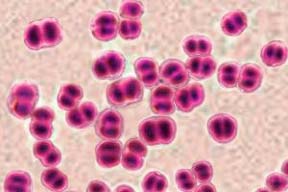 LONDON: Researchers have shown for the first time that nasal drops of harmless bacteria can inhibit a related bug that sometimes causes meningococcal disease.
LONDON: Researchers have shown for the first time that nasal drops of harmless bacteria can inhibit a related bug that sometimes causes meningococcal disease.
Meningococcal disease is caused by Neisseria meningitidis, which can infect the lining of the brain and the spinal cord, causing meningitis. Strains of the bacteria can also cause serious bloodstream infections.
N meningitidis can also live silently in a person’s nose and throat, without illness. These “colonized” carriers can spread the pathogen to others through close contact.
In the study, researchers placed drops containing low doses of Neisseria lactamica, a related but harmless bacterial strain, into the noses of 149 healthy university students in the UK.
A control group of 161 students received drops of saline instead. Nose swabs were taken at regular intervals over six months and tested for both types of bacteria.
Among students who received the N lactamica drops and became colonized, the harmless bacteria appeared to prevent N meningitidis from colonizing the students’ throats.
The “good” bacteria also displaced the worrisome pathogen in those who were already carrying it when the study began.
The effect was seen after just two weeks, when the number of students carrying N meningitidis in their upper airway dropped by 9.5 per cent among those who were also colonized by N lactamica using the drops. The effect lasted for at least four months.
“It’s the first time that anyone has taken a bug – a friendly bacterium – and has shown that it changes the way that you can become colonized by the meningitis bacterium, Neisseria meningitidis,” said study author Robert C Read of the University of Southampton in the UK. -PTI





